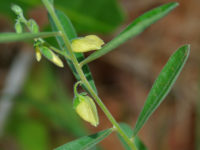A Potential Breakthrough in Alzheimers Research from Nigeria: ABS Implications
As noted elsewhere on this blog, traditional knowledge is increasingly seen as a source of scientific innovation with commercial applications. A recent example of this phenomenon comes from the University of Nottingham, United Kingdom, where researchers suggest a plant extract from Nigeria may help combat Alzheimer’s disease. The extract from the leaves, stem and roots of Carpolobia lutea may help protect chemical messengers in the brain that are crucial in memory and learning. A biopharmacological and phytochemical review of the herb can be found here.
Herbalists in Nigeria have used the plant for centuries as an aphrodisiac and as a treatment for genitourinary infections, gingivitis, and waist pains, but this extract could also be used to develop new “blockbuster” drugs to combat Alzheimer’s disease without some of the current medicine’s side effects. The Alzheimer Society of Canada reported that in 2016 alone approximately $10.4 billion was spent treating those with Alzheimer’s (this includes both medical system and out of pocket costs). The Carpolobia herb may also possess anti-inflammatory, antimicrobial, and antimalarial properties. This is important for the science of Alzheimer’s research as it is suggested that Alzheimer’s patients have inflammation in the brain.
According to Dr. Wayne Carter of the University’s Division of Medical Sciences and Graduate Entry Medicine, “[these] findings suggest that traditional medicines will provide new chemicals able to temper Alzheimer’s disease progression.” Dr. Cater noted there is increased life expectancy and increased numbers of people with dementia, and traditional medicine may provide the way to curb Alzheimer’s progression.
The Carpolobia herb is far from Nigeria’s only potential contribution in the development of innovative new medicines. Nigeria is rich in biodiversity, with ecosystems varying from swamp forests and coastal vegetation to derived savannah. This biodiversity plays an important part in the economy and cultural life of many Nigerians. There are numerous threats to this biodiversity and TK however, including over-exploitation, climate change, and pollution. It is important to keep this biodiversity intact to preserve culture, TK, and protect possible future advancements through the study of TK.
A concern exists among some experts from the Convention on Biological Diversity and the Nagoya Protocol about the possibility that TK and genetic resources may be used to study and heal diseases more prevalent in developed nations than developing ones. For example, Alzheimer’s is a fairly widespread condition in developed countries such as Canada, while it is perhaps less prevalent (or underdiagnosed) in Nigeria. The Carpolobia herb is also suggested to have antimalarial properties; however, the market for Alzheimer’s drugs is significantly more lucrative – this effectively means that Nigerian TK is being used to treat a condition that may not rank high in terms of the health care priority of Nigerians, rather than being used to benefit the community from where it was originally sourced through intensification of research on malaria. While both diseases have tragic effects, the concern is that corporate return on investment is being favoured over what will benefit the most people globally (Daniel Robinson, Biodiversity, Access and Benefit-Sharing: Global Case Studies (London, UK: Earthscan, 2015, at 205). This is the very core of the ABS debate: how do we ensure equitable access to benefits derived from genetic resources and associated traditional knowledge, when Western development paradigms and concepts of IP incentivize only the most “lucrative” and Western-market oriented applications?
Nigeria should benefit from advancements made using its TK. Nigeria has among the highest incidences of malaria and highest malaria mortality rates of any country in the world, and 97% of the population is at risk of contracting the disease. Any benefits derived from the genetic resources and TK of Nigerians should flow back to those same people and their communities. As the provider of this TK and this particular genetic resources, Nigeria should not be exploited by global users, who stand to benefit greatly should the Carpolobia herb yield a breakthrough in Alzheimer’s disease research. Perhaps a win-win situation would be not only an ABS system that focuses on monetary returns to the community from proprietary uses of their TK, but also one that accommodates research and development in diseases or conditions that are an urgent priority in a particular source community whose genetic resources and associated traditional knowledge drive the innovation in question.






